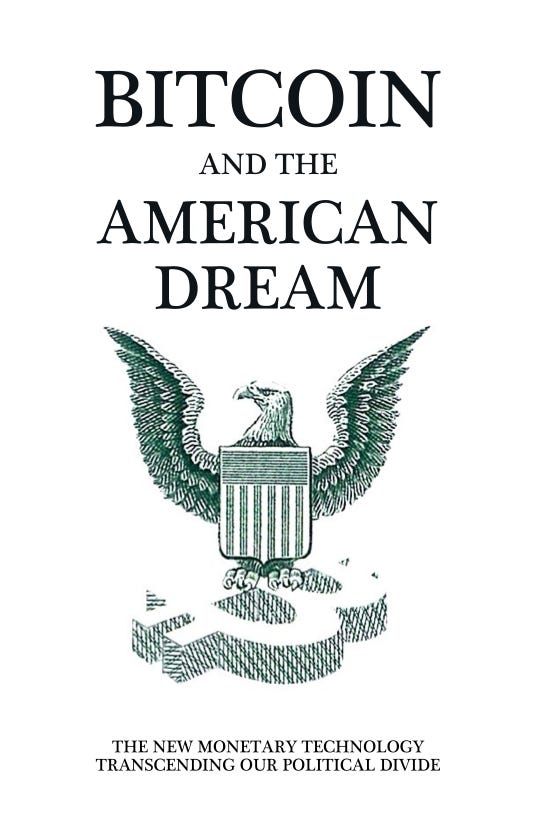Everyone's a Bank Now. Bitcoin Tech Talk #277
Airlines are a tough business. The customer base is culturally attuned to paying as little as possible for flights, there are all sorts of regulations, it’s taxed like crazy and the cap ex is incredibly high. Add unions for every job, the vicissitudes of weather, jet fuel prices and random travel restrictions and you have yourself a very difficult industry to succeed in
Yet when you dig into how these airlines make money, you realize that they’re pretty profitable, despite the high costs. Is it because they’re innovating at such a rapid rate that they can outpace inflation? No. Is it because they’re raising prices constantly? No. The reason airlines stay afloat is due to their loyalty programs.
Operationally, airlines actually lose money. Airline prices haven’t kept up with salary increases, fuel price increases and so on. Most of these airlines are operating at a loss and their flying businesses have negative equity. The reason airlines are able to post profits is because of their loyalty programs.
Loyalty programs started as a way to incentivize flyers to become repeat customers. But as these airline miles became desirable, other companies wanted to offer them to customers and piggy back on the perceived benefit. This meant that airlines could sell miles to these companies. Those companies, like, say a credit card company, could offer them as an incentive to their customers. This is the main way in which airline companies now make money.
Yet what do these miles represent? They can be redeemed for flights or in some cases into gift cards or something else, but they’re essentially promise of future goods, or what we would normally call credit. Airlines issue credit to make up for the lack of profitability of their operations. In other words, they’re banks, able to issue their own currency.
This explains why they can operate despite not making money. They’re able to sell future flights ahead of time in the form of miles. This ends up far more profitable than selling current flights. This also explains why miles programs have gotten worse over time. It used to be that you could book a round-trip ticket anywhere in the continental US for 25,000 miles. Now there are lots of restrictions on dates, you have to book way ahead of time and you get worse seats. The miles in many programs also expire and the amount of miles required have gone up.
This is the equivalent of inflation and a way for airlines to discharge the debt they’ve created by selling so many miles over the years. They’re really banks that use transporting people on airplanes as a loss-leader to get customers. This is also why governments are so intent on bailing them out, because if they really went bankrupt, all those miles would become null and void, wiping away a significant amount of wealth, especially for people like Mark Cuban. Fiat money, in other words, helps keep this system afloat.
These sort of financial shenanigans where future revenue is brought forward is not only true of airlines, however. Nearly every big business employs some financial tools to make them more bank-like. At a certain size, they all get into some form of financing to spur current demand. Think about all the loans you can get to buy cars, computers or even phones. The economy has been infected with fiat money that allows companies to play these financial games to make their cash flows look a lot better than in an honest market.
The hope of Bitcoin is in ending so many of these weird incentives that exist due to fiat money.
Bitcoin
Pavol Rusnak shows how you can build Bitcoin on Android. This is very interesting as you can easily run Bitcoin in Pruned mode and it’ll fit comfortably within the hard drive space of most modern Android phones. An Android wallet that connects to this node would be something a lot more self-sovereign than, say the typical mobile wallet. I’m amazed, by the way, that you can generate APKs like this using Docker.
Maxim Orlovsky is proposing an extension to PSBT for pay-to-contract use-cases. Pay-to-Contract or P2C for short, is the idea that a payment can be definitively linked to a particular thing that it paid for. So, for example, if you bought a car using Bitcoin, the payment could be linked to a contract that gives you the car for a certain amount of Bitcoin. The way it works is that the hash of the contract is in the tap-spend side of a p2tr address, making the on-chain transaction show that the payment is committing to some contract hash. The contract can then be revealed later should there be any disputes. It’s clever and integration with PSBT makes a lot of sense as it’s a valuable use-case.
Lloyd Fournier explains how CTV improves DLCs. OP_CTV is the covenants proposal from BIP119, which essentially adds a condition on spending that the transaction it’s spent in fit a certain template. This seemingly simple OP code dramatically simplifies the computations needed for discrete-log contracts, which require quite a lot of computation, especially if the contract concerns something pretty fine-tuned, like, say, the Bitcoin price in USD. This is a fairly compelling use-case for DLC usability, though the computations are only done by the interested parties and, not, say every node on the network.
Braiins explains proof-of-work in layman’s terms. The article uses the analogy of a dice roll to bring the point home that it’s not a “complicated math problem” as much as it is someone getting lucky. Luck in this case can be controlled somewhat by more rolls of the dice. I still like my analogy that the luck in this case is 76 consecutive flips of heads, but then, the dice analogy works pretty well. It’s just a 2^76 sided die and you need to roll a 1 and each hash computed is a dice roll.
Lightning
Roy Scheinfeld has a bunch of Lightning-related news in Germany, of all places. As he explains, their PoS (point-of-sale) Lightning solutions are reaching new use-cases, in this case a top-flight German basketball team in Ulm. Apparently, that’s a city with a very strong Bitcoin presence, with a community of Lightning devotees that rival Bitcoin Beach’s. They even have a fully functioning Lightning ATM. Along with the aforementioned El Zonte and perhaps Bedford, this is rapidly becoming one of those out-of-the way places that Bitcoiners should visit.
Ably is a Lightning browser wallet. The wallet works as an extension on various browsers and allows you to tip creators directly. They’re using a standard called WebLN, which is a protocol for communication between a web page and a lightning node. I didn’t realize that WebLN had such a big following and it looks like a nice standard if you’re looking to work with something on the Web and Lightning.
LNURLVend is an offline lightning vending machine. The way it works is that you scan a url from the vending machine, pay using lightning on the website it points to and you get a pin to get the actual item from the machine. This allows the machine to stay off-line and yet verify payment. This is a powerful idea that really needs to be explored more. For example, this would make rentable scooters much easier to run since they won’t have to connect to the internet.
Impervious AI has announced a browser! The announcement claims to be “Zoom, without Zoom. Google Docs, without Google. Medium, without Medium. WhatsApp, without WhatsApp. Payments, without banks. Identity, without the state.” This is intriguing as we know all the browsers are seriously centralized and depend a lot on selling your data. Instead, it’ll have lightning integration built in, perhaps as a way to make the browser less evil. I look forward to the announcement at Bitcoin 2022.
Economics, Engineering, Etc.
Arizona is considering a bill to make Bitcoin legal tender. The main benefits would be that people of the state could pay their taxes and such with Bitcoin as well as opt to receive their salary in Bitcoin. The idea would be that you wouldn’t have to have a bank account or be financially surveilled. Not to be outdone, there’s a gubernatorial candidate in Texas running on a platform of making Bitcoin legal tender in Texas.
Geyser is a Bitcoin crowd-funding platform. Of course, people have been able to post their Bitcoin address online since almost the beginning, so it’s a bit redundant, but the idea here seems to be to give worthy causes more of a voice in a crowded landscape. This is a far cry from 2013 when every Bitcoiner on Twitter seemed to have a tip address, hoping that they’d get some tips. Then they all found out that people need a good reason to send tips. Using the crowd to discover good reasons seems to be the play here.
Trezor is removing AOPP as is Sparrow. AOPP stands for Address Ownership Proof Protocol and it’s a way to prove coins being sent out of exchanges are owned by the same person. The argument for AOPP is simple enough. You don’t want users to get hacked out of their coins and AOPP forces additional hurdles, perhaps enough to thwart some thieves. The argument against it is that AOPP is a standard that other jurisdictions can easily add, making coins much less fungible. As such, AOPP supporting wallets have decided to pull their support.
Arthur Hayes argues that we’re in for quite a bear market. His analysis goes through the political implications of various scenarios, especially in the credit markets. As he explains, the market is right now bottomless because the marginal seller are the investment houses who took a position in the past year or so. In other words, the institutions are the weak hands that may need shaking out before we can head higher. I don’t know if I agree with his analysis, but it’s thoughtful and I do agree that for the administration, 7% unemployment is a much bigger threat than 7% inflation, which means there’s probably more money printing ahead.
Quick Hits
You can hold Bitcoin in a bank account now.
Look at all the Bitcoin developer bounties.
If you want to de-Google, this is something you should look into.
Amazing how these centralized altcoin foundations call the top.
There seems to be a regulatory attack against Bitcoin.
Another week, another scam changes its name to avoid all the negativity around its old name.
Events
Bitcoin and the American Dream book launch is happening in Washington DC on February 10th. Come join me and meet the authors as well as some influential DC people for the event!
I am in London for Advancing Bitcoin March 3-4. I am also going to be at Bitcoin 2022 in Miami April 6-8.
I’ll also be doing the Programming Blockchain seminars in London March 1-2 and Miami April 4-5.
Podcasts, Etc.
On this week’s Bitcoin Fixes This, I talked to Max Keiser and Stacy Herbert about what’s happening in El Salvador. We talked about their history, the economic impact and the freedom from the IMF that they’re experiencing.
I read through last week’s newsletter which you can find here.
I was on Stock Showdown to talk about Bitcoin. Here is the latest book which is out now!
My other books are here and here.
Unchained Capital is a sponsor of this newsletter. I am an advisor and proud to be a part of a company that’s enhancing security for Bitcoin holders. If you need multisig, collaborative custody or bitcoin native financial services, learn more here.
Fiat delenda est.












